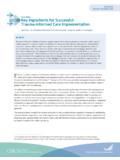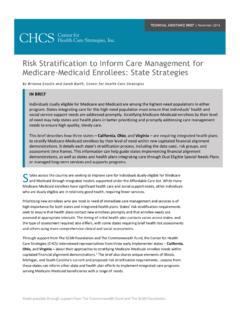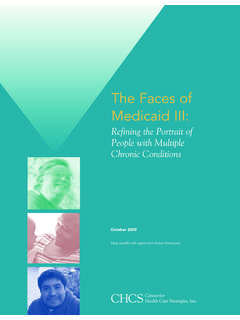Transcription of Understanding Trauma: The Effect of Trauma on Health
1 FACT SHEET | JUNE 2017 Understanding the Effects of Trauma on Health growing body of research shows that experiencing traumatic events increases an individual s risk of long-term physical and behavioral Health As Health care providers and policymakers begin to understand these connections, Trauma -informed approaches to care are being adopted as a crucial aspect of high-quality Health care in hopes of improving patient engagement and outcomes while lowering costs. What is Trauma ? Trauma results from exposure to an incident or series of events that is emotionally disturbing or Events that may be traumatic include: Experiencing or observing physical, sexual, and emotional abuse; Childhood neglect; Having a family member with a mental Health or substance use disorder; Experiencing or witnessing violence in the community or while in the military; Natural or human-made disasters and forced displacement; Sudden, unexplained separation from a loved one.
2 War or terrorism; and Poverty, discrimination, and historical Trauma overwhelms a person s coping capacity and has long-term effects on functioning and Normal, protective responses to threats ( fight, flight, or freeze ) are activated by the perception of a threat. A person who has experienced Trauma may continue to experience this defensive response, even in situations that are not Not all children or adults who are exposed to potentially traumatic events experience long-term Health problems.
3 This may be due to protective factors, which help shield individuals from the lasting effects of Trauma . Protective factors include: parental knowledge of child development; healthy parent-child attachment; social connections; and social and emotional 8 A Trauma -Related Definitions There is no universal definition of Trauma . However, the Substance Abuse and Mental Health Services Administration describes Trauma as resulting from: an event, series of events, or set of circumstances experienced by an individual as physically or emotionally harmful or life-threatening with lasting adverse effects on the individual s functioning and mental, physical, social, emotional, or spiritual well-being.
4 9 Following are definitions of terms related to Trauma : Toxic Stress: Strong, frequent, and/or prolonged adversity that stimulates the body s natural protections against stress and can have a long-term negative impact on neurobiology, psychology, and physical Allostatic Load: Wear-and-tear on the body from toxic stress that can lead to poor Health and Health risk Protective Factors: Social conditions or personal attributes that help lessen the risks of Trauma for an individual, family, or 64%83% ACEs StudyPhiladelphia Urban ACEs StudyPrevalence of Childhood TraumaAt least 1 ACE4 or more ACEsTwo major studies of adverse childhood experiences (ACEs) provide a glimpse into the prevalence of childhood Trauma : Original ACEs Study7surveyed middle-class, primarily white (non-Hispanic) individuals with some college education.
5 Philadelphia Urban ACEs Study8surveyed racially diverse sample of adults who completed high school. FACT SHEET: Understanding Trauma : The Effect of Trauma on Health 2 How Does Exposure to Trauma Affect an Individual s Health ? A growing body of research is uncovering a link between traumatic childhood experiences and a greater chance of physical and behavioral Health problems in Multiple studies, including the original ACEs study and the Philadelphia Urban ACEs study, link childhood Trauma with lifelong Health problems, including:14,15,16 Chronic lung and heart diseases; Liver disease, viral hepatitis, and liver cancer; Autoimmune diseases; Sexually transmitted infections.
6 And Depression and other mental Health conditions. How Does Childhood Trauma Affect Neurobiology? Before age five, children s brains are in a critical period of development. Positive experiences can lead to healthy brain development, while negative experiences can promote unhealthy development. Prolonged Trauma can decrease the volume of areas of the brain responsible for cognitive functions such as short-term memory, emotional regulation, and higher cognitive Which Populations are More at Risk for Experiencing Trauma ?
7 Members of historically marginalized populations appear to have a disproportionately higher prevalence of Trauma and ACEs than the general population. These groups include (but are not limited to): 18, 19, 20, 21, 22 People living in low-income communities; Black, Hispanic, and other racial minorities; Lesbian, gay, bisexual, and transgender individuals; Individuals with disabilities; and Women and girls. How Does Childhood Trauma Affect Health Risk Behaviors? Children with Trauma exposure often develop coping mechanisms to help alleviate the hurt they feel as a result of Trauma .
8 Sometimes, these strategies evolve into Health risk behaviors for example, eating unhealthy food or overeating, tobacco use, or drug and alcohol When childhood traumatic stress goes untreated, these coping mechanisms can contribute to anxiety, social isolation, or chronic diseases. Can the Effects of Trauma be Avoided or Addressed? Protective factors, such having supportive relationships and a positive future outlook, can help shield individuals from the effects of The potential Health implications of traumatic events do not have to be life-long.
9 Trauma -specific physical and behavioral Health treatments, as well as creating Health care and social service systems that employ Trauma -informed principles, can help patients begin the healing process. How can Health Care Providers Help Patients Heal from Trauma ? Health care providers can build Trauma -informed Health care organizations that create safe, caring, inclusive environments for all patients. Trauma -informed care acknowledges that Understanding patients life experiences is key to delivering effective care and has the potential to improve patient engagement, treatment adherence, and Health outcomes.
10 Implementing Trauma -informed approaches to care may also help avoid provider and staff burnout and workforce turnover. Through Trauma -specific treatments, such as Prolonged Exposure Therapy, Seeking Safety, and the Trauma Recovery and Empowerment Model, Health care providers can help patients begin to address their Trauma experiences and start the healing What Kinds of Policy Changes can Support Trauma -Informed Care? Health care payers, Health systems, states, and federal agencies can pursue policy changes to support the adoption of Trauma -informed care.









